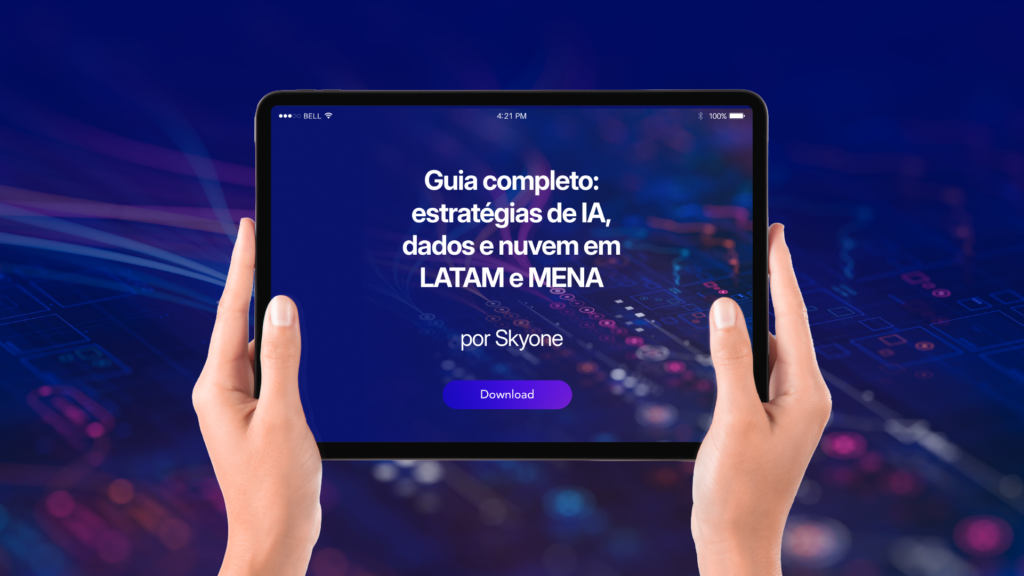The adoption of Large Language Models (LLMS) is significantly advancing, driven by state -of -the -art models such as Llama 3 (Goal) , Claude 3 (Anthropic) , Mixtral (Mistral) and the updates of OpenAi . These technologies have been reshaping the way organizations treat natural language, task automation and data analysis.
At the same time, interest in private LLMs , which aim to ensure confidentiality, compliance and control over the data used in these models. In this article, we will explain what LLMs are, their applications in the corporate context and how solutions such as Skyone Studio enable the safe and strategic use of these technologies.
What are LLMS (Large Language Models)?
LLMS are models of AI trained in massive text volumes. From this base, they learn to identify patterns in human language and generate coherent content, answer questions, summarize, translate and even program.
Technical Base: LLMS operate based on tokens , minimal language units representing words or words of words. Behind these models are architectures such as transformer , responsible for significant advances in contextual understanding capacity.
A typical paragraph consumes about 100 tokens; An article with 1,500 words, approximately 2,000 tokens.
The performance of an LLM depends on factors such as:
- Volume and diversity of the training corpus
- Parameterization capacity (number of parameters )
- Inference efficiency (time and cost to generate answers)
- Fine-Tuning Techniques and Reinforcement Learning with Human Feedback)
Why are LLMS in evidence?
In recent years, we have seen three trends converge to boost the LLMs:
- Technological advancement of foundational models
opening models such as Llama, Falcon, Mistral and Gemini allowed customization and use in private environments. At the same time, closed models like GPT-4 and Claude evolved into reasoning, memory and safety. - General AI growth in
companies adopt LLMS for service automation, sales copilotes, document analysis, content generation and technical support. - Concerns about privacy and sovereignty of data
arise private LLMs , locally implemented or in controlled cloud environments, ensuring that sensitive corporate data are not exposed to public models.
Also read: “It was in autonomous agents: when technology resolves conflicts alone.”
Private llms and their challenges
Private LLMs allow companies to use the capacity of generative models with internal data, maintaining confidentiality. However, its adoption requires:
- Data Organization and Structuring (in Data Lakes, Lakehouses or Data Warehouses)
- Security layers and access control
- Integration infrastructure with legacy systems
- Monitoring and auditing capacity of the generated outputs
It is an ecosystem that goes beyond the model itself, requires solid data base, interoperability between systems and integration with the operation.
How to apply LLMs safely and scalability: the case of Skyone Studio
Skyone Studio is a complete product that enables the application of corporate AI agents from a safe and integrated robust architecture.
Main components:
- IPAAS (Integration Platforms A Service) : Allows the integration of over 400 systems with low use of code, creating automated flows to connect CRMS, ERPs, Legal Platforms and Cloud Systems.
- Lakehouse : Modern data structure that unites the scalability of data lakes with the reliability of data warehouses, prepared to support advanced analysis and LLM inference.
- AI agents : Creation of multiple smart agents with LLM support, real -time inference and integration with channels such as WhatsApp, Google Chat and interactive dashboards.
Skyone Studio 's AI agent's ability to automate integrations is directly driven by LLMs. The LLM is the engine that allows the Studio to understand the integration needs, translate requests into natural language and perform the necessary actions to connect the systems. Studio's “without code” proposal is amplified precisely by this intelligence: the model understands what needs to be done and automates the process in a contextual and safe way.
- Data Publication and Conversation : Generation of insights and views that can be activated by natural commands in conversational interfaces.
Use Cases:
- Companies like Panasonic and Pay Less use Skyone Studio to reduce operating costs, accelerate decision making, and automate high volume processes.
- An example of impact: 40% reduction in data processing time , with the proper structuring of the informational base for Generative AI use.

Conclusion
LLMS are undoubtedly one of the main vectors of current digital transformation. But for its corporate use to be successful, it takes more than just adopting a language model: it is necessary to build a data ecosystem, integration and governance .
Solutions like Skyone Studio deliver this foundation: integration between systems, data lakehouse, intelligent automation and full support for creating LLM -based agents.
Companies that structure this environment will now be ready to lead the next generation of artificial intelligence in business.
Author
-

Raquel is a marketing director with 15 years of experience in high growth B2B companies. It works in the development of integrated demand generation strategies, ABM, content and brand positioning, with expansion focus and acceleration of results. Throughout his career, led teams, boosted releases, and supported the entry into new markets. He believes marketing goes far beyond numbers, is about connecting people, solving problems and accelerating success stories.




